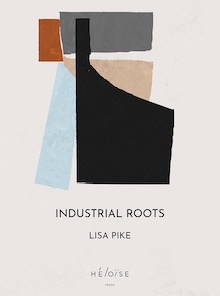
Héloïse Press, 2023
In Industrial Roots, a collection of connected vignettes, author Lisa Pike explores the lives of working-class women in Ontario, writing in a style that is reminiscent of oral storytelling, of the digressive anecdotes of a great aunt.
Told by different female narrators, these seventeen stories follow a family across three generations. Grandmothers, aunts, cousins, and daughters populate the pages. One woman cares for her mother, who is dying slowly; another contends with her ex-husband’s alcoholism; yet another harbours a secret longing to steal babies. Many have absent fathers, abusive husbands, and ageing parents. Most have money trouble. In every story, the disputes, grudges, and rivalries are both completely relatable and wholly unique.
The men in these stories are flawed: they drink to get drunk, gamble away savings, and beat and cheat on their wives. But they’re also products of their environments, and Pike gives them the complexity they deserve. She explores how toxic masculinity is inherited, and how hostility and violence are often the only ways men know how to express complicated emotions like grief, sorrow, anxiety, and fear. In “Cowboy Kenny,” for example, a woman is reminded of her father every time she hears her husband pop open a Labatt Blue: “Like most men on the street, her father alternated between sadness drowned in a bottle and rage channelled through fists that hit whatever and whoever was closest.”
In this collection, names are mentioned off-hand, as if the reader already has intimate knowledge of the family. At the start, the effect is disorienting. I wanted a family tree to keep track of everyone, and to stimulate this desire was perhaps Pike’s intention. I’ve felt similarly at family events: What’s his sister’s boyfriend’s name? Who’s so-and-so’s husband? Often we have few or no memories of far-flung relatives, and we are unaware of the histories connecting distant relatives, great uncles and second cousins. Capturing this ambiguous experience is one of the collection’s strengths, and I took great pleasure in writing down the character’s names and relatives for reference. One of my favourite characters is Gramma Ruby, who knows her family’s stories intimately. In “Two-Bit Tommy,” she digresses on the phone with her granddaughter, name-dropping relatives that the reader has yet to meet:
She said he didn’t want no big funeral. Good thing too ‘cause I don’t have the money
to fly out there, though I’d like to be there for her. Elsie not dead a year, and now
Tom. Linda’s an orphan now, just like you. No parents a t’all,’ she adds before finally
taking her second drag.
Death and mortality are core themes of Industrial Roots, and funerals anchor many of the stories. Pike examines how families talk (or don’t talk) about death, and she shows how a death can act as a magnet, drawing distant or estranged relatives back together. She also looks at how stories are passed down across generations and, most importantly, how these stories keep the dead alive in the memories of those who survive.
Throughout the collection, Pike varies her register using slang and colloquialisms rooted in working-class Ontario. The dialogue is always incredibly telling, laden with subtext and intention. Pike writes with microscopic focus, with a clear love of small peculiarities and humdrum clutter: a ceramic pig that sits on a grandmother’s stove, a platter with blue roses faded to teal green, a plastic slotted spoon with chips and cracks. No object is trivial, as they help ground us in time and place. They reveal inner complexities, family history, and sentimentality. The nitty-gritty details are particularly lovely in “The Two Stellas,” a story about the rift between two cousins who share the same name. I especially loved the specificity in this scene, where Judith notices her grandmother Stella deciding which relative will inherit what after she dies:
But once she started writing family members’ names in her scrawl of blue ballpoint ink, Judith understood that this was part of the unspoken project of the bits of masking tape torn from the roll kept in the kitchen drawer under the dark brown ageing microwave beside which her grandmother faithfully kept, for some unknown reason, two flyswatters of orange and bright green plastic.
What I enjoyed most about Industrial Roots was its dedication to shedding light on women’s experiences in blue-collar families and on related themes with wider relevance, such as invisible labour, abusive relationships, and the perpetuation of toxic masculinity. I also loved how the stories were tightly interwoven. Instead of a collection of disparate stories, this book reads like a single work divided into smaller parts. The collection rewards the attentive reader willing to follow one story as it leads into the next. At its heart, Industrial Roots is about the narratives that bind us. It asks us to sit quietly and listen to our own family’s dinner-table stories—in Pike’s words, “to hear them and remember them.”
+++
Lisa Pike was born in Windsor, Ontario. She studied in France, worked in Italy, and completed her PhD at the University of Toronto. Her fiction and poetry have appeared in magazines and anthologies including CV2, The New Quarterly, Riddle Fence, Re: Generations: Canadian Women Poets in Conversation and VIA: Voices in Italian Americana. She is the author of a poetry chapbook, Policeman’s Alley; and a novel, My Grandmother’s Pill (Guernica Editions, 2014).
+
Megan Callahan (she/her) is a fiction writer, book reviewer, and French-to-English translator. Her short stories have appeared in Carve, FreeFall, Nashville Review, Room, and PRISM International, among others, and in several anthologies, including Best Canadian Stories 2021. She lives in Tiohtià:ke/Montréal with her husband and daughter.